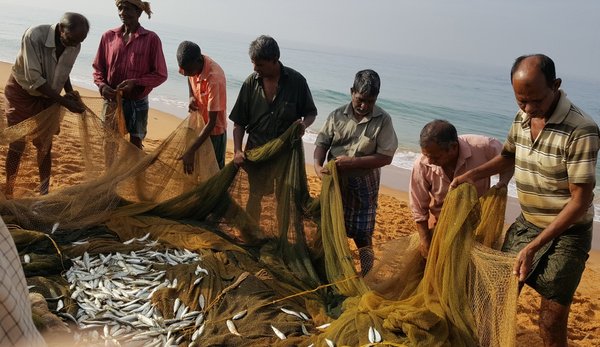- Share this article
- Subscribe to our newsletter
Fish micronutrients “slipping through the hands” of the malnourished
Millions of people are suffering from malnutrition despite some of the most nutritious fish species in the world being caught near their homes, according to new research published in the scientific journal Nature. Children in many tropical coastal areas are particularly vulnerable and could see significant health improvements if just a fraction of the fish caught nearby was diverted into their diets.
As well as omega-3 fatty acids, fish are also a source of important micronutrients, for example iron, zinc and calcium. Yet, more than two billion people world-wide suffer from micronutrient deficiencies, which are linked to maternal mortality, stunted growth and pre-eclampsia, the researchers say. For some nations in Africa, such deficiencies are estimated to reduce Gross Domestic Product (GDP) by up to eleven per cent.
Just fishing more is not the answer
This new research suggests that enough nutrients are already being fished out of the oceans to substantially reduce malnutrition and, at a time when the world is being asked to think more carefully about where and how we produce our food, fishing more may not be the answer.
Lead author Professor Christina Hicks of Lancaster University’s Environment Centre in Lancaster, UK, said: “Nearly half the global population lives within 100 kilometres of the coast. Half of those countries have moderate to severe deficiency risks; yet, our research shows that the nutrients currently fished out of their waters exceeds the dietary requirements for all under five-year-olds within their coastal band. If these catches were more accessible locally they could have a huge impact on global food security and could combat malnutrition-related disease in millions of people.”
The Lancaster University-led research team collected data on the concentration of seven nutrients in more than 350 species of marine fish and developed a statistical model for predicting how much nutrition any given species of fish contains, based on their diet, sea water temperature and energy expenditure.
This predictive modelling, led by Aaron MacNeil of Dalhousie University in Halifax, Canada, allowed researchers to accurately predict the likely nutrient composition of thousands of fish species that have never been nutritionally analysed before.
Using current fish landings data, they used this model to quantify the global distribution of nutrients available from existing marine fisheries. This information was then compared with the prevalence of nutrient deficiencies around the world.
Their results showed that important nutrients were readily available in the fish already being caught but that they were not reaching many local populations, who were often most in need. For example, the amount of fish currently caught off the West African coast – where people suffer from high levels of zinc, iron and vitamin A deficiencies – was sufficient to meet the nutritional needs of the people living within 100 kilometres of the sea.
Parts of Asia, the Pacific and the Caribbean were just some of the other coastal regions showing a similar pattern of high malnutrition despite sufficient fish nutrients in the local catch.
Researchers say that a complex picture of international and illegal fishing and trade in seafood – along with cultural practices and norms – are standing between malnourished people and the more-than-adequate fish nutrients caught on their doorstep.
Sound policies needed
The study highlights the need for fish policies that are focused on improving nutrition rather than simply increasing volumes of food produced or the revenues generated from fish exports.
Associate Professor Aaron MacNeil, of the Ocean Frontier Institute at Dalhousie University, in Halifax, Canada, says: “As demand for ocean resources has increased up to the limit of what can be harvested sustainably, projects like this show that there are opportunities to fish strategically to address fundamental challenges to human health and wellbeing.”
(CGIAR/wi)
Reference:
Christina C. Hicks et al. (2019). Harnessing global fisheries to tackle micronutrient deficiencies. In: Nature, September 2019
DOI: https://doi.org/10.1038/s41586-019-1592-6
Further reading:





Add a comment
Be the First to Comment